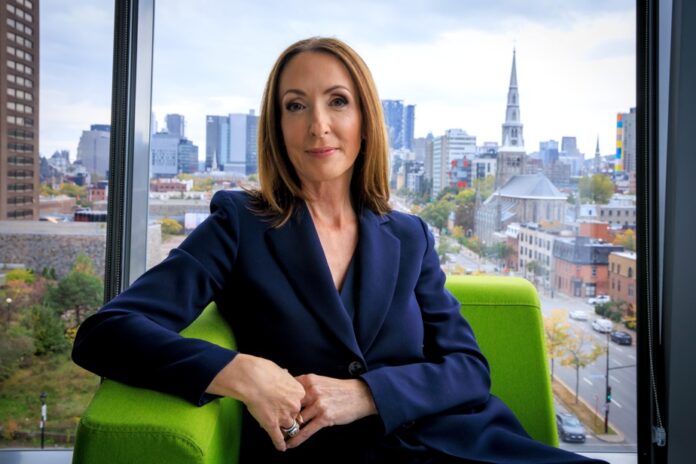What was supposed to be a collection of memories borrowed from the past today finds an unfortunate echo in current events. Delving into the studies she conducted on the Middle East and her meeting with a mysterious Palestinian student, journalist and anchor Claudine Bourbonnais weaves the web of a fascinating personal story, against a backdrop of political suspense.
Destiny is Others is published as the Israeli-Palestinian conflict is experiencing one of its most significant escalations in recent decades. A sad coincidence for its author Claudine Bourbonnais who recounts events taking place in 1988, 1989 and 2006. Divided into three acts, the story opens with her university studies at Durham University in Great Britain, continuing in Cairo where she experienced her first contact with the Arab world and ends straddling Montreal and London where the author learns the truth about Marwan, this Palestinian student she met.
Although she had planned time off that evening, she reluctantly had to follow the events outside the frenzy of the Radio-Canada news room.
“For several months, there had been tensions that we were talking about in the news bulletins, but what happened, no one saw it coming,” underlines the one who has been at the helm of Téléjournal weekend since 2021 . “It is certain that what is happening right now will cancel out hopes for peace for a little while. That’s what’s sad. It’s a story that repeats itself. »
However, in 1988, a few years before the signing of the Oslo Accords, peace was within reach. “We really believed in it,” she remembers. There was the first intifada. It triggered a whole movement, a negotiation process which gave us hope that we were witnessing the construction of a better world. »
It is this “dark optimism” of the late 1980s that she wanted to portray in this fluid and well-crafted story, which appears nine years after Métis Beach, a first novel set in the 1960s which had delighted the critical. Congested job market, fear of AIDS, prohibitive interest rates marked the young adults of this generation, his, but politically, there reigned at this period an ambient optimism fueled by the fall of the Berlin Wall and the liberation of Nelson Mandela. An optimism which, according to her, has obscured the rise of Islamism embodied by the character of Marwan, a real man, since dead, whose first name she changed since, she justifies, it is not her story that she tells.
“Peace in the Middle East, so close to the goal at the time, has been derailed like the rest of our expectations of this world,” she writes. Is there no hope other than violence – and attacks? I refuse to believe it. » Recent events have not overcome this hope that she then carried within her. “Will the scale of this attack and the scale of what it will bring as a response from the Israelis provoke a certain awareness and lead the international community to become even more involved in the peace process? ? It is to be hoped. »
Destiny is the Others is the tenth work in collection III of QuébecAmérique, built on memories taken from the lives of the authors, without however completely eliminating fiction. How did the journalist navigate between reality and invention? “I think the important thing is for the reader to dive into a story and believe it,” she replies. At their core, the most important facts are real. Talking about yourself was an exercise that was new to me and only talking about yourself doesn’t necessarily make for very good stories. It was necessary to construct a narrative framework. »
Modest by nature, despite her public work, Claudine Bourbonnais does not like to put herself forward. “It’s more important to talk about others than about myself,” she says. Thus, she wanted to use her own story to tell the decisive encounters she had in her life: this Lebanese professor she met at CEGEP, her friend Paul from university, journalists in Cairo who made her want to practice. this job.
So, if hell is other people, as Jean-Paul Sartre wrote, they can also carry our destiny, the author thinks. “I don’t believe people who say they built themselves. I believe we are inspired by others. »
Thus, she welcomes in her story her husband Gilles Le Bigot, also a journalist at Radio-Canada, who died in 2017. The one who went out at night to clear snow from his car on stormy evenings so that she could go and host the show morning of RDI.
“My great friend Abla Farhoud, to whom I dedicate this book, always told me: “Writing is seeking to understand.” We write to find answers to our questions. I had never understood to what extent my meeting with Gilles would perhaps not have taken place if we had not had this common interest in the Middle East. » An interest that she also shared with her writer friend of Lebanese origin, who died two years ago. “It was Abla who gave me the desire to write and it was Abla who let me believe that perhaps I too could, one day, write a book and be published. Without Abla Farhoud, I would not be here to talk about the book I wrote. »
Without the editor Danielle Laurin either, whose offer to participate in this collection allowed her to transform this second novel into a short story, perhaps too close to her, which she had started, but struggled to continue. And here she goes again to write a new novel about which she will not say a word “because it is quite new”.















